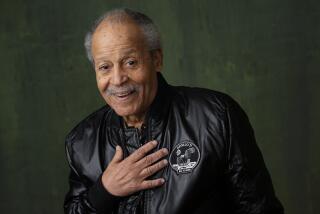Frank E. Petersen Jr. dies at 83; flier was Marines’ first black general
- Share via
When Frank E. Petersen Jr. heard that a pioneering black naval aviator had died fighting in the Korean War, he was astonished.
“I had no idea blacks would be allowed to fly in the Navy or in the Marine Corps,” he recalled years later.
Petersen went on to become the Marine Corps’ first African American aviator and its first black general, bucking racism at nearly every step of a distinguished military career.
After joining the Marines in 1952, he flew 350 combat missions in Korea and later in Vietnam, where he was decorated with the Purple Heart after his plane was shot down over the demilitarized zone.
Petersen, who had joined the military to escape the constraints on blacks in his native Kansas, died Tuesday at his home in Stevensville, Md., of complications from lung cancer, said his son, Frank E. Petersen III. He was 83.
He enlisted in the Navy in 1950, two years after President Truman ordered the desegregation of the military. He entered the Naval Aviation Cadet Program in 1951, the year after Jesse L. Brown, the Navy’s first African American pilot, was shot down over North Korea and died trapped in the wreckage of his plane.
In 1952, Petersen was commissioned as a second lieutenant in the Marine Corps, which had only a few black officers at the time, and began an arduous climb through the ranks.
During flight training at the Naval Air Station in Pensacola, Fla., he rode a bus to Mobile, Ala., taking a seat that the driver deemed too close to the white section. Even though segregation in interstate bus travel was illegal, Petersen was in the Jim Crow South and was ordered off the bus.
He noticed other black passengers making room for him at the back of the bus, but “I was angry at the system,” he recalled in an oral history for the National Visionary Leadership Projecthttps://www.visionaryproject.org/petersenfrank/, and got out.
Navy Shore Patrol officers drove him away in a police wagon, but stopped after a few blocks.
“I thought, here is where we get the bumping and the thumping,” Petersen said in the oral history.
But the MP, who was white, knew Petersen was two months away from completing his flight training and becoming the Corps’ first African American pilot. “He said, ‘Petersen, you are about due to graduate. Take it easy — you’re going to make it,” and let him go.
“It’s nice when there is a first,” Petersen reflected decades later. “But the last thing America needs is a first and an only. That separates us as a people.”
Born March 2, 1932, in Topeka, Kan., he was the oldest son of the former Edith Southard, a Kansas University graduate, and Frank Petersen Sr., who built his own electronics repair business after immigrating from St. Croix in the Virgin Islands. He credited his parents with challenging him to tackle any barriers thrown at him.
Desperate to get out of Topeka, he talked his parents into letting him sign up for the Navy in 1950.
He passed the Navy entrance exam on his first try, but a few days was asked to take it again. He hadn’t cheated — the clear implication — and passed with a high score again.
Petersen would never forget the reaction of the petty officer who administered the test.
“My God,” the recruiter exclaimed, “what a great steward you’d make!”
He started as a seaman’s apprentice and electronics technician. When he learned that he could try out for the naval aviation school, he was afraid of failure but determined to challenge expectations. “When someone says that you can’t or shouldn’t do something,” he told the Washington Post in 1988, “I go ahead and try it to see why the person didn’t want me to do it.”
He told the Post that one of his instructors had flunked him when he flew a solo flight, but he won his wings after others intervened.
He went on to serve with Marine Fighter Squadron 212 during the Korean War. Later he commanded an aircraft group, an amphibious brigade and an aircraft wing.
He earned a bachelor’s degree in 1967 and a master’s in international affairs in 1973, both from George Washington University.
In 1979, he was promoted to brigadier general. He earned his second star in 1983 and his third star in 1986. He was head of the Marine Corps Combat Development Command in Quantico, Va., when he retired in 1988.
Divorced from his first wife, the former Eleanor Burton, he is survived by their children, Gayle, Dana, Lindsey and Frank III; his second wife, Alicia, and their daughter, Monique; a grandson and three great-grandchildren.
He said the Marine Corps was the last branch of the military to get a black general.
“Just to be able to say you kicked down another door was,” he said, “a sense of great satisfaction.”
Twitter: @ewooLATimes
The Associated Press contributed to this report.
More to Read
Start your day right
Sign up for Essential California for the L.A. Times biggest news, features and recommendations in your inbox six days a week.
You may occasionally receive promotional content from the Los Angeles Times.







